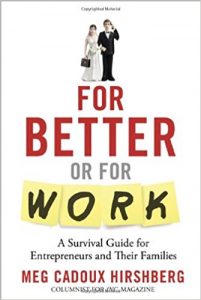For Better or for Work: A Survival Guide for Entrepreneurs and Their Families
by Meg Cadoux Hirshberg
 Couples of all kinds hope there is a rewarding balance to be discovered between their work outside the home and their family life in the home. But many couples will testify that the work-life balance they seek is elusive; work has a way of stealing away time and energy badly needed at home.
Couples of all kinds hope there is a rewarding balance to be discovered between their work outside the home and their family life in the home. But many couples will testify that the work-life balance they seek is elusive; work has a way of stealing away time and energy badly needed at home.
Meg Cadoux Hirshberg’s “For Better or for Work” examines the impact of work life on family life from her vantage point as an entrepreneur’s wife. Her husband Gary Hirshberg, with her at his side, started the now-successful Stonyfield Yogurt business.
But it took nine years of hard work for the business to break even financially. During that time there was the risk it could fail – a risk that gave rise not only to considerable anxiety but that led to even more hard work. To complicate things, the business literally was conducted on the home front.
Some regard “For Better or for Work” as a book about business and for people in business. But I regard it principally as a book about the interrelationship of work, marriage and family life. For couples, this is a complex relational web; it can yield pain for them if they do not give it the thoughtful attention it requires.
Hirshberg calls her book “a guide to navigating the emotional and logistical terrain of business building while simultaneously enjoying a fulfilling family life.” Nothing about her book suggests, however, that this type of navigation is easy.
Are there ways to ensure that the needs of a marriage and the goals of family life do not get lost amid the consuming goals of a business that seems ever present and always ready to make its own needs known?
That is the kind of question Hirshberg hopes entrepreneurs and their spouses will ask. Of course, people of all kinds invest or overinvest themselves in their work. So the question is theirs too. In addition, many of Hirshberg’s insights apply to spouses who work from home.
During the time an entrepreneur is starting a business and building it up, a wife and husband are likely to find it difficult to find time for each other. Hirshberg understands the truth of this well. She suggests to spouses, though, that finding time for each other is vital. Moreover, she writes, “being together reminds you that you enjoy being together.”
But it is a real problem that “when you are building a business, there is never a right time – for anything,” Hirshberg suggests. “There’s no right time because there’s no time, and usually no money either.”
“The reality is,” she says, “that businesses are like babies: They need you when they need you. And they always need you – your time, your attention, and your energy.”
I particularly enjoyed Hirshberg’s discussion of the start-up of a business on a family’s home premises, perhaps the only affordable location for them at that point. She may not have intended it to be humorous, but the image of an employee appearing unexpectedly or at an awkward moment in the kitchen, for example, made me smile.
“Home-based businesses are usually a mixed bag: somewhat convenient and somewhat onerous,” Hirshberg says. She concludes that a “family that shares space with a company must create the mental and emotional equivalent of physical distance – the gap that keeps their worlds from colliding.”
One question for a family whose business is in their home is whether and when their children can bring friends home. A problem, the author indicates, is that the commotion of friends might interrupt the hard-at-work parent who is struggling with a financial matter or who needs to spend time on the phone.
Hirshberg discusses issues faced by a husband and wife who work together in a family business. One chapter addresses the risk of divorce for entrepreneurs who in some ways seem married to their work.
The “technology creep” is yet another topic of the book — technology’s way of sneaking into every corner of life and enabling one spouse to keep working in any and every location – during dinner or in the bedroom, for example, or via a smart phone while on vacation.
Clearly, entrepreneurs and their families need strategies for dealing with the technology creep,” Hirshberg writes.
If Hirshberg realizes the risks a family’s start-up business can create for a marriage, she appears to know its happier dimensions as well. This is not a discouraging book, but it is a book of many awarenesses.
“For Better or for Work” looks at marriage from a unique perspective and encourages couples to approach both their work and their relationship with their eyes wide open.
About the reviewer
David Gibson served for more than 37 years on the Catholic News Service editorial staff.
Disclaimer: Book reviews do not imply and are not to be used as official endorsement by the USCCB of the work or those associated with the work. Book reviews are solely intended as a resource regarding publications that might be of interest to For Your Marriage visitors.




